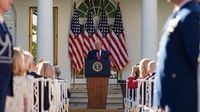On October 14, 2025, the White House Rose Garden was transformed into a stage of high political drama, commemoration, and controversy as President Donald Trump posthumously awarded the Presidential Medal of Freedom to Charlie Kirk, the conservative activist who was fatally shot just over a month prior. The event, which coincided with what would have been Kirk’s 32nd birthday, drew an eclectic crowd—cabinet members, Republican congressional leaders, intelligence and military officials, far-right media personalities, billionaire donors, and even Argentine President Javier Milei, according to the Associated Press and multiple sources.
Erika Kirk, the late activist’s widow, accepted the award on his behalf, her voice trembling and her eyes brimming with tears as she addressed the audience. “Thank you, Mr. President, for honoring my husband, in such a profound and meaningful way. And thank you for making this event a priority,” she said, as reported by WJW and the Associated Press. “Your support of our family and the work that Charlie devoted his life to will be something I cherish forever.”
Charlie Kirk, who founded Turning Point USA in 2012, was shot and killed on September 10, 2025, while delivering a speech at Utah Valley University. His death sent shockwaves through the conservative movement and beyond, prompting both the U.S. House of Representatives and Senate to approve a resolution earlier in the year declaring October 14 a “National Day of Remembrance” for Kirk’s legacy, as reported by WJW.
President Trump, who had just returned from a whirlwind diplomatic mission to Israel and Egypt to celebrate a ceasefire in the Gaza conflict, made it clear that honoring Kirk was a top priority. “I raced back halfway around the globe,” Trump told the crowd, joking that he almost asked Erika Kirk to reschedule the ceremony, but ultimately realized, “today was Charlie’s birthday.” Argentine President Javier Milei, who had been visiting the White House, stayed to attend the ceremony, underscoring Kirk’s international profile and the global reach of the event.
Trump’s speech was full of praise, calling Kirk “a great American hero” and “martyr” for freedom. “We’re here to honor and remember a fearless warrior for liberty, beloved leader who galvanized the next generation like nobody I’ve ever seen before, and an American patriot of the deepest conviction, the finest quality and the highest caliber,” he said, as quoted by the Associated Press. Trump went further, casting Kirk’s killing as an act of political violence, saying, “He was assassinated in the prime of his life for boldly speaking the truth, for living his faith and relentless fighting for a better and stronger America.”
The ceremony, however, was not without controversy. According to the World Socialist Web Site, the event was described as “grotesque and openly fascistic,” with critics arguing that it was being used to canonize Kirk as a “Christian martyr” and to accelerate the criminalization of political opposition. Trump’s remarks drew a direct line between Kirk’s death and what he described as “radical left violence extremism and terror,” vowing that the country would have “absolutely no tolerance” for such acts. He claimed, “We are done with the angry mobs and we are not going to let our cities be unsafe.”
In the wake of Kirk’s assassination, Trump announced directives to the Attorney General and the Department of Homeland Security to confront what he labeled as left-wing terrorism. “So that’s why last month I directed the attorney general and Department of Homeland Security to confront the very real threat of left-wing terrorism in our country,” Trump said, according to the World Socialist Web Site. He went on to promise the dismantling of networks that he claimed were funding such groups, a statement met with applause from the crowd.
As the medal ceremony was underway, the Trump administration took another controversial step: the State Department revoked the visas of six foreigners from Argentina, Brazil, Germany, Mexico, Paraguay, and South Africa, citing their derisive or mocking comments about Kirk’s assassination on social media. “Aliens who take advantage of America’s hospitality while celebrating the assassination of our citizens will be removed,” the State Department declared, as reported by the Associated Press. The administration has also ramped up efforts to identify and expel foreigners involved in unrest or critical of U.S. policies, including expelling South Africa’s ambassador and revoking visas for other high-profile figures.
This crackdown has sparked concerns among civil rights groups and critics, who argue that such actions threaten constitutional protections for freedom of speech. Critics point out that the First Amendment applies to anyone in the United States, not just citizens, and that targeting individuals for their political opinions—especially those expressed online—marks a troubling shift. Deputy Secretary of State Christopher Landau even encouraged social media users to report offensive language about Kirk, stating he was “disgusted to see some on social media praising, rationalizing, or making light of the event, and have directed our consular officials to undertake appropriate action.”
Erika Kirk’s remarks at the ceremony were deeply personal, reflecting on her husband’s life, faith, and the future he envisioned for their family and country. She shared a touching moment with their 3-year-old daughter, who said she would have given her father a stuffed animal and a cupcake for his birthday. Erika Kirk speculated that her husband might have run for president “but not out of ambition. He would only have done it if that was something that he believed that his country needed from his servant’s heart.” She concluded her speech with a poignant reflection: “To live free is the greatest gift but to die free is the greatest victory.”
Kirk’s legacy remains sharply contested. While President Trump and his supporters credit him with inspiring a generation of conservatives and helping secure Trump’s reelection, others point to his divisive rhetoric on issues such as LGBTQ rights and race. Kirk was known for sharply criticizing gay and transgender rights and for making inflammatory statements about racial justice, including calling George Floyd a “scumbag” and repeating Trump’s false claims about immigration policies.
The political implications of the ceremony and the administration’s subsequent actions are still unfolding. Supporters see the moves as a firm defense of national values and security, while critics warn of an encroaching police state and the erosion of democratic norms. The debate over Charlie Kirk’s legacy—and the meaning of his death—has become a flashpoint in America’s ongoing struggle over free speech, political violence, and the boundaries of dissent.
As the sun set over the newly renovated Rose Garden, the crowd dispersed, but the questions raised by the day’s events lingered. In honoring Kirk, the Trump administration drew clear lines in the nation’s political sand—lines that will surely shape debates, policies, and protests for months and years to come.


